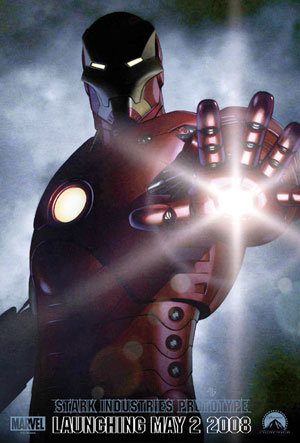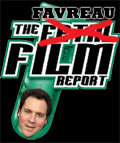 Could one on ones with Jon Favreau be a Comic Con tradition? I certainly hope so. Last year I talked to him about Zathura and practical special effects as well as growing up in Queens; this year it’s all Iron Man. That’s Favreau’s next picture, which should begin filming in February.
Could one on ones with Jon Favreau be a Comic Con tradition? I certainly hope so. Last year I talked to him about Zathura and practical special effects as well as growing up in Queens; this year it’s all Iron Man. That’s Favreau’s next picture, which should begin filming in February.
The movie doesn’t have a finished script, but Favreau has already given a lot of thought to what his take will be like on every level from story to character to thematic elements. Iron Man has never been my favorite character, but after spending a couple of minutes talking with Favreau it’s not hard to pick up the guy’s enthusiasm.
I caught up with Jon at the tail end of his lunch. As he finished up his sandwich we made a little small talk about the Marvel Movie panel, which he would be going to after the interview, and where he would appear with Shaun of the Dead director Edgar Wright.
Favreau: I love Shaun of the Dead. It’s a little like Swingers meets Dawn of the Dead.
Q: Have you met Edgar yet?
Favreau: No. But I did like the movie enough to watch the behind the scenes featurette, though. So I feel like I have.
Q: Why Iron Man?
Favreau: Why? First of all, Avi [Arad]. Ever since Daredevil we’ve been talking about doing something. I’d always been leaning towards, from a creative standpoint, Captain America. It seemed like fertile ground, not just for the storytelling but in humor – a guy frozen in time and waking up, there’s a little Austin Powers opportunity there. But cinematically Captain America is scary. I’m not a CG believer – you have to prove to me it can be done. An organic character, like a guy in tights, in CG, I don’t buy it yet. Doing a robotic suit in CG? Now you’re talking. You could do reflections right, surfaces right. You can finally do it right as a movie – and it’s a character that’s never been done in a movie before.
Q: It’s an untouched property.
Favreau: Right. What Bryan Singer and Chris Nolan was dealing with on their franchises is that they were trying to make good films with the added pressure of having good films made before them with the same characters. This is a tabla rasa, I can do anything.
And what’s great is that you’ve got an arms dealer with a definite conservative political leanings taken hostage in, in this case, Afghanistan right now in the real world. What happens to that guy? How does the world see him? How does he see himself? How does he change? There’s a tremendous amount of opportunities from a character and story viewpoint, which is my background. The popcorn takes care of itself in a way; my job is to keep it real enough that you buy it and you’re not disengaged emotionally from the story. If you can have the popcorn aspect of the film not take you out of the emotional aspect of the film, then I think you’ve really got something. I think this is the one franchise and the one character where you really can do it.
And this is the first Marvel movie. From a financial standpoint, this is an independent film.
Q: It’s got to be really liberating to be working with the new Marvel Studios.
Favreau: It’s the best of both worlds.
 Q: You’re not fighting with executives who want to give him a cute robot sidekick or whatever.
Q: You’re not fighting with executives who want to give him a cute robot sidekick or whatever.
Favreau: And then you’ve got Avi and Kevin [Feige] and Ari [Arad] who have been through it enough to know how to translate it to the screen in a way that it’s not becoming a niche genre piece. But you have all the freedom of an independent film and all of the support and resources of a big Paramount movie. You get spoiled as a filmmaker. We’re going to shoot this thing in LA with a character that I love with a built-in recognition factor. After Zathura I’m just happy to have a movie whose name you can pronounce.
Q: One of the challenges for Iron Man is that he doesn’t have the kind of a rogues gallery that Spider-Man or Batman have. His biggest villain is himself in a lot of ways, but you’re not hitting that alcoholism story here. What are you going to do for a bad guy?
Favreau: The first thing that’s important to me is not to have a rogues gallery of magic based or mutation based villains that also happen to live in this world. The only leap I want the audience to make is that the repulsor technology allows him to build the suit and be Iron Man – everything else has to be real. All villains have to be tech-based. How do you take a character like the Mandarin and transpose him to this reality? That’s what we’re working on now.
Q: And he’s a tough character because in his original appearances he’s a racist caricature.
Favreau: There are certain fears and certain strengths the character evokes that are applicable, but of course you have to completely remove any of that short sighted cultural ignorance that leads to any sort of bigotry in the storytelling. That isn’t to say those fears and shortcomings of Iron Man as relating to that character aren’t relevant.
Think about what made the Mandarin someone everybody gravitated to – if you look at the message boards, overwhelmingly that’s someone everyone wants to see. He was intelligent, he was powerful, he was mysterious. He was always one step ahead. Despite his suit and technology, Iron Man was always the underdog. Mandarin always had this Machiavellian web he would fall into. He was based in China which was then mysterious because it was Red China. Today China is mysterious in other ways because it’s Global China. China is the economic powerhouse that is quickly catching up and will eventually surpass us.
economic powerhouse that is quickly catching up and will eventually surpass us.
Q: Which works perfectly with Tony Stark as the billionaire industrialist.
Favreau: That’s exactly right.
What are the ten rings of the Mandarin now? Are they magic rings that shoot fire and ice out of his fingertips? Probably not. Is he a guy with a Fu Manchu mustache? Probably not. Is he a guy from the East who is mysterious in what his desires and goals are, and is he a formidable enemy to Tony Stark? Yes. For sure. And so the fun is how do you make it so that the fan of the books know you’re paying attention to what’s there but at the same time make it relevant to the real world, real politics story we’re trying to tell.
Q: How old are you going with Tony Stark? In the comics he tends to be a little bit on the older side.
Favreau: I want to do 30s for sure, and I think we’ll have the freedom to do that. I think you buy him anywhere from early 30s to early 40s. You also want a guy who you believe really runs a company. You don’t want Doogie Howser. You also want a guy who’s going to be around and fun to have in future episodes that will be a few years apart. So you want somebody who is in that right age, and somebody who has got the chops but who isn’t famous yet.
Q: So you’re looking at this as setting up a franchise? You’re approaching this film as the sringboard for future stories?
Favreau: Yes. I got to know where he’s going. I got to know the alcoholism is coming in later. I got to know how this one ends and what Iron Man stands for at the end and how he moves through the world. He’s not a vigilante. He’s a political force. He’s emblematic of America right now, with all the technology and power but there’s a conflicted nature as to when to act and with how much force. When to get involved and when not to get involved. These are all interesting things you could actually explore on a mythic level with a superhero. It’s a lot more interesting than doing a Syriana type movie. What should America represent, and how does Iron Man embody that? It’s fun.
Q: I talked to Avi Arad last week and he said that with Marvel bringing the characters back into the fold there was more of a chance of them crossing over. I know that you want to keep the character believable, but is there any thought of setting Iron Man in something like the Marvel Universe?
Favreau: Not right now. You can, but I think sometimes it undermines the reality of the story. I wouldn’t set him in a quote unquote Marvel Universe in the first film. Maybe others could emerge, but there’s a convenience factor where you’re asking the audience to buy a lot when you’re saying not only is this guy a superhero, the guy across the street is a supervillain. It becomes a bit too storybook for this particular franchise. This has to be based in real politics with real people, and the only thing I want audiences to have to buy is that the suit can really fly.